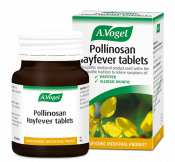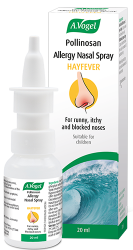Allergic rhinitis and coughing
From congestion to itching, there are many troublesome symptoms of allergic rhinitis. The condition comes about as a result of the immune system, which regards things like pollen and mould spores as dangerous. So, when it comes into contact with these things it does its upmost to destroy them. This involves releasing the chemical which causes some of the problems already mentioned.
For those suffering from allergic rhinitis, if allergens enter the back of the throat they can cause irritation. This, in turn, triggers coughing - an automatic response to get rid of the allergen. However, this is not the only thing that causes the problem.
When allergens irritate the nose it can cause the production of excess mucus as the body attempts to wash these things out. This mucus may cause a runny nose but it may also run down the back of the throat to cause irritation there – a problem known as the postnasal drip. Once again this triggers coughing as the body automatically attempts to rid itself of this mucus.
How to tell if allergic rhinitis is causing your cough
Unfortunately, coughing can be caused by many things other than allergic rhinitis which makes it difficult to determine what’s at the root of the problem. A cold or flu for example, may result in a cough that’s not too dissimilar from the type caused by allergic rhinitis.
If you are worried about your cough it’s best to visit your doctor to get checked out. However, in the meantime, to help you figure out if allergic rhinitis is the cause of your cough, here are a few things to consider.
Duration – a cough that is the result of a cold or flu does not usually last much longer than two weeks so if yours goes on for longer than this, it could be allergic rhinitis that’s behind it.
Relief – anti-histamines can be obtained from a doctor or pharmacist and are used to treat allergic rhinitis. Therefore, if your cough subsides after taking this medication it can indicate that allergic rhinitis was the cause.
Severity – an unrelenting cough may also be associated with allergic rhinitis.
Other symptoms – as mentioned, there are a variety of symptoms associated with allergic rhinitis so if you experience things like congestion, itching, watery eyes and fatigue alongside your cough then allergic rhinitis may be at the root of the problem.
What can you do?
Drink warm lemon and honey – this is a tried and tested cough remedy for good reason as the warm liquid helps to soothe the throat and rid it of irritation.
Help out your immune system – the immune system is put under a great deal of strain when it’s busy fighting off allergens so it’s a good idea to help it out as best you can. You may want to take some Echinaforce Echinacea Drops for example, which support the immune system.
Stay hydrated – water helps to wash out any allergens that are lurking in the throat and which are therefore causing a cough. However, it also stops your throat from getting dry and irritated which would worsen a cough.
How to avoid contact with allergens
When you know the allergen that’s causing your cough, the best thing you can do is avoid it. However, this can be incredibly difficult so here are a few ideas to help you out.
Animal dander – if you have pets, avoid this allergen by having pet-free zones within your home. As you spend a lot of time in your bedroom this is a good place to start.
Dust mites – these little allergens hide in bed sheets and carpets so to help keep them at bay, make sure you wash these things twice a week. You could also use allergy-proof bedding to lessen your contact with them.
Mould spores – to prevent the growth of mould make sure you use extractor fans when cooking and washing.
Pollen – use pollen counts to gain some control over you allergic rhinitis symptoms. When counts are high, stay indoors and when levels are low, it’s safe to go outside!
Herbal remedies
Bronchoforce Chesty Cough Remedy – this contains ivy, thyme and liquorice to help with a mucus cough.
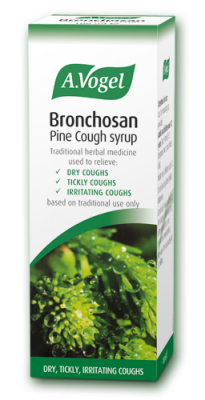 Bronchosan Pine Cough Syrup – this is made from the extracts of freshly harvested pine shoots and can be used to treat a dry, tickly cough.
Bronchosan Pine Cough Syrup – this is made from the extracts of freshly harvested pine shoots and can be used to treat a dry, tickly cough.
Pollinosan Hayfever Tablets – these contain seven tropical herbs to address various symptoms of allergic rhinitis such as congestion and inflammation. Also, unlike a lot of hayfever remedies, this one is non-drowsy yet effective!
Conventional treatments
Anti-histamines – as mentioned, these are prescribed for allergic rhinitis as they block the release of histamine which causes many of the symptoms associated with the condition.





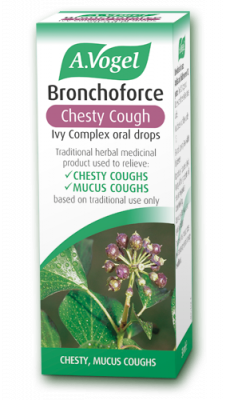
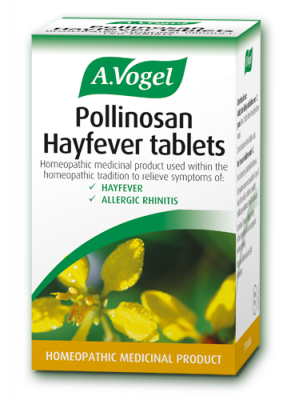
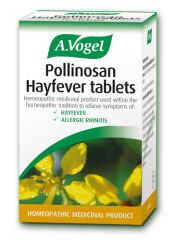 Looking for a solution to curb those hayfever symptoms such as itchy eyes, constant sneezing and congestion, then look no further than A.Vogel’s Pollinosan Hayfever tablets.
Looking for a solution to curb those hayfever symptoms such as itchy eyes, constant sneezing and congestion, then look no further than A.Vogel’s Pollinosan Hayfever tablets.
